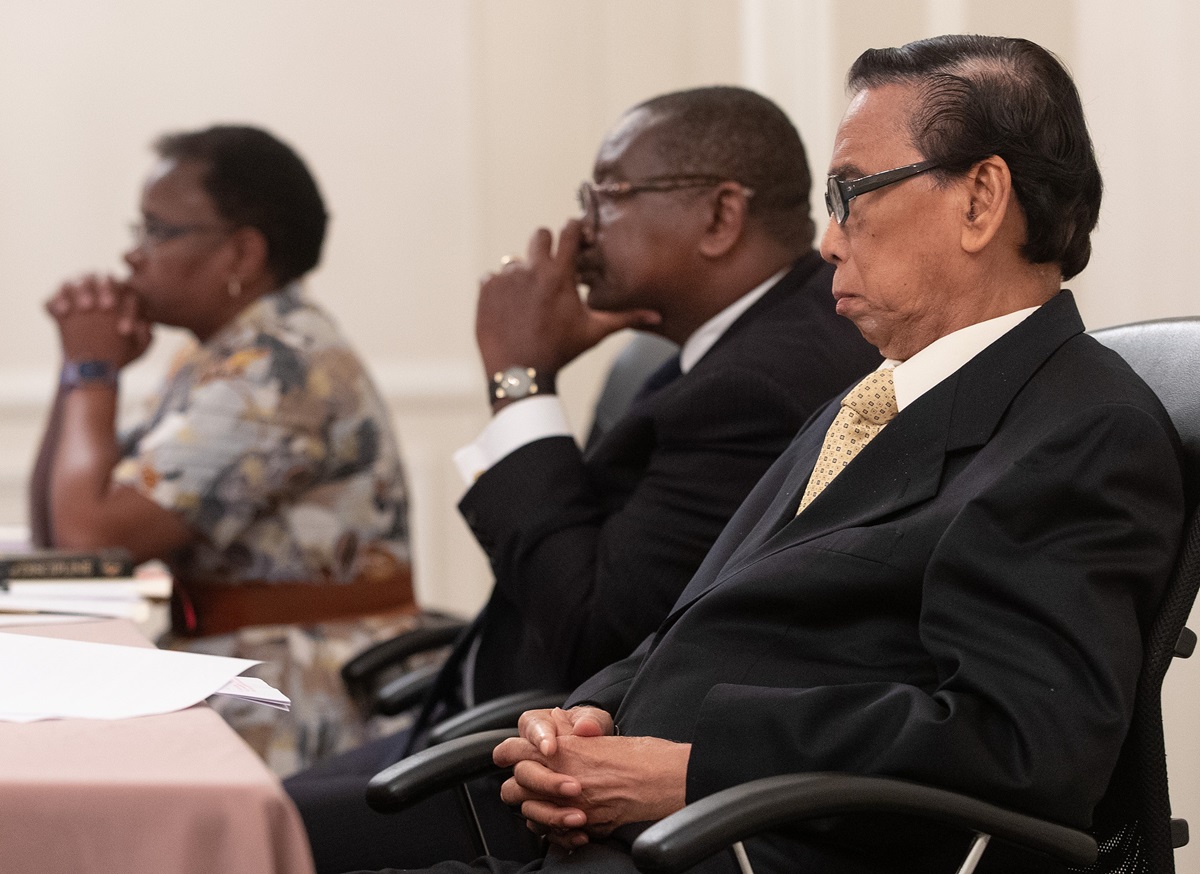The Traditional Plan adopted by the General Conference 2019 needs further consideration and clarification by The United Methodist Church’s top court, the president of the Council of Bishops said in an oral hearing.
The request by the United Methodist Council of Bishops is Docket 3 on the Judicial Council’s Oct. 28-Nov. 1 agenda.
The bishops asked for a declaratory decision on “the constitutionality, meaning, application and effect of certain petitions adopted as the Traditional Plan,” specifically on five questions about the effects of the plan “that need to be addressed for the benefit of The United Methodist Church.”
During an Oct. 30 oral hearing, Bishop Kenneth H. Carter, the council’s president, explained that the motivation for the request stemmed from the bishops’ interaction “with real people” affected by the plan.
“The matters before us are neither academic nor abstract,” Carter said. “They are where we and the church live. This impacts persons who are called to ministry and persons who are served by them.”
The Council of Bishops is not attempting to nullify the results of General Conference 2019, Carter told the Judicial Council. “We are simply appealing to you to clarify how this is implemented.”
The Council of Bishops identified 21 or more potential issues within the Traditional Plan needing further examination, Carter added, but chose five particular issues “because these impact the day-to-day work of the church.”
The Rev. Thomas Lambrecht, vice president of the traditionalist advocacy group Good News and one of the authors of the Traditional Plan, expressed dismay that the plan was still under review.
Subscribe to our
e-newsletter
Like what you're reading and want to see more? Sign up for our free daily and weekly digests of important news and events in the life of The United Methodist Church.
But Carter stressed that the need for clarification is directly related to the bishops’ responsibility to lead. “Our role as bishops is to adjudicate the results of the 2019 General Conference,” he told Judicial Council members. “Bishops of all theological perspectives need guidance on how to administer these provisions.”
William Waddell, legal adviser for the Council of Bishops, told the court that the issues raised in Docket 3 “are technical legal issues but they’re fundamental and foundational in how we do the work.”
That foundation includes the concept of fair process and the principle of legality, as articulated in two recent decisions, Decisions 1341 and 1366, Waddell said.
The first two questions raised by the Council of Bishops arise from the expanded definition of “self-avowed practicing homosexual” in Paragraph 304.3 (Petition 90032) of the Book of Discipline, which now includes living in same-sex marriage, domestic partnership or civil union.
The council wants to know if the expanded definition applies to those already ordained and, if so, if it is unconstitutional because the categories of “living in a same-sex marriage, domestic partnership or civil union” do not allow for the presumption that a person is “practicing” to be rebutted.
The legislation also creates the presumption of a common meaning in the three categories of domestic partnership, civil union and marriage, Waddell said. He added that, “makes chargeable something that was not chargeable when the person was ordained or commissioned.”
Lambrecht responded that the denomination has had rules prohibiting same-sex marriage as long ago as 1984 and said the expanded definition of a self-avowed practicing homosexual “is really an attempt to gain some accountability where none has been.”
Another question centered on the constitutionality of a certification requirement for a disciplinarily mandated examination of clergy candidates.
The other two questions refer to the new minimum penalty of a one-year suspension without pay for a person found guilty of performing a same-sex marriage ceremony. If the binding civil law — such as employment law — in an annual conference provides that no person, including persons serving as ordained clergy, can be suspended without pay, the bishops asked, could that penalty still be enacted?
A similar question applies to persons appointed to an extension ministry and paid by an entity other than the church.
“The potential for extension ministry is that extension ministry could be compromised,” said Carter, referring to educators as well as military and hospital chaplains employed and compensated by institutions outside the church.
The issue is whether the legislation imposing the penalty would violate the principle of legality because it could not be applied equally, the bishop said.
In addition, “the civil laws of other nations are in conflict this plan,” Carter said.
Bloom is the assistant news editor for United Methodist News Service and is based in New York.
Follow her at https://twitter.com/umcscribe or contact her at 615-742-5470 or newsdesk@umcom.org. To read more United Methodist news, subscribe to the free daily or weekly digests.
Like what you're reading? Support the ministry of UM News! Your support ensures the latest denominational news, dynamic stories and informative articles will continue to connect our global community. Make a tax-deductible donation at ResourceUMC.org/GiveUMCom.




